Module10 Unit1
外研版(三起)英语三年级下册Module 10 Unit 1 Here's a red hat课件

重点句型
Module 10 Unit 1 Here's a red hat.
1. Let's put on funny clothes for the party. 让我们为聚会穿上滑稽的衣服。 【详解】let's 是 let us 的缩写形式。该句型的意思 是“让我们……吧”或“咱们…吧”。“Let's ...”句 型主要用于表示建议或征求对方的意见、邀请对方和自己 一起做某事等。
animals
have got
bed
sweater
sport
Module 10 Unit 1 Here's a red hat.
课文详解
Listen, point and say.
哇!我有一件绿色的毛线衫。
Module 10 Unit 1 Here's a red hat.
Listen and repeat.
Oh, I can't walk! 哦,我不能走路了!
【详解】 can't = cannot,意为“不能,不会”,后接动词原形。 I can't write.我不能写。 She can't read.她不能读。
Warm up
Module 10 Unit 1 Here's a red hat.
课文详解
重点句型
Module 10 Unit 1 Here's a red hat.
Here's a book. 这儿有一本书。
Here are my books. 这是我的书。
【注意】 当某物为可数名词复数时,句中的 is 应改为 are。
重点句型
Module 10 Unit 1 Here's a hat.
八年级上册Module_10__Unit_1_It_might_snow
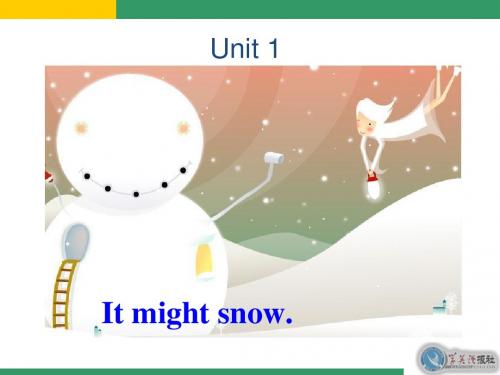
/wiʃ/
使人烦恼的;可怕的 adj.terrible 但愿;希望 v. 或许;可能 adv. 快点
度;度数 prep.
/'prɒbəbli /
come on
wish probably
Say some words about the
weather
Weather
sun ny
晴朗的
cloudy rainy snowy sunny windy
cloudy -8~2º C
What’s the weather in Beijing? It’s… What’s the temperature? It’s…
2. Listen and check the correct information in the table.
rainy It’s ______.
foggy It’s ______.
a heavy shower It’s _____________.
it’s________
stormy
It’s ______. snowy
cloudy It’s _______.
sunny It’s _______.
windy It’s _______.
Then listen and read.
Betty: Hey, boys! Tony: Hi, Betty. Hi, Lingling. Where are you going? Betty: We’re going to the park to skate. There’s thick ice on the lake. Are you coming with us? Tony: Are you joking? It’s really cold today. Daming: And it’s cloudy too, so it might snow. Lingling: What’s the temperature? Tony:It’s between minus eight and minus two degrees! Winter is colder here than in England. Daming: Is it snowy in England in December?
Module 10 Unit 1
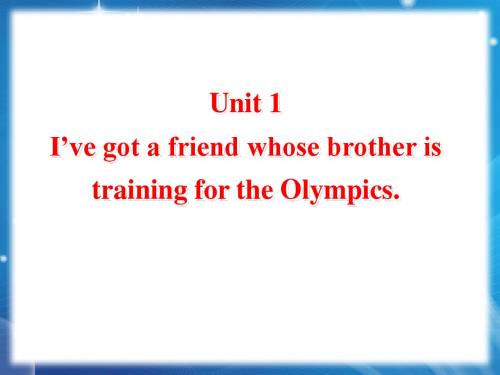
Guess the meaning of the phrases.
1. a bit
not very much
2. give up can not insist 3. unlikely impossible
4. bumቤተ መጻሕፍቲ ባይዱ into meet by chance
5. What’s up? What’s happening?
2. Why does Lingling say Tony is lucky? Because her friend’s brother is training for the Olympics, while Tony is only playing in the school team. 3. What will the boy in Daming’s team need to do? He’ll need to take a lot of exercise ---go funning or do weight training.
Useful phrase
1. a bit=a little 稍微;有点 2. give up doing sth 放弃做某事 3. stay fit = keep healthy 保持健康 4. train for the Olympics 为奥运而训练 5. go running (去)跑步 6. do weight training 举重训练 7. not … any more 不再 8. bump into 碰见;偶遇;巧遇
课后练习 Ⅰ. 请根据句意用适当的介词填空。 1. The film star’s visit ____ our school to made us very happy. 2. We should ban bikes ____ the motorway from (高速公路). 3. He is training _____ the coming school for sports meeting. 4. I bumped _____ one of my classmates in into the street just now.
五年级上册英语教案- Module10 Unit 1 He was in the kitchen.

五年级上册英语教案- Module10 Unit 1 He was in the kitchen
一、教学目标
语言知识目标
1.能够听、说、读、写本单元的核心词汇和句型。
2.能够正确应用动词过去式was/were。
3.能够通过听、说、读、写等方式,理解句子中的时间和地点信息。
情感态度价值观目标
1.培养学生对过去事情的兴趣,引导学生了解过去的文化和历史。
2.培养学生观察、思考、分析的能力,提高对英语学习的兴趣和自信心。
二、教学重难点
教学重点
1.动词过去式was/were的应用
2.听、说、读、写本单元的核心词汇和句型。
教学难点
1.根据听到的句子中时间和地点信息,准确理解句子的含义。
2.能够在口语表达时,正确运用was/were。
三、教学方法
1.听说互动法;
2.观察法;
3.交际法。
四、教学过程
1. Warm-up
1.Greet students and ask about their weekend;
2.Encourage students to share something interesting about their weekend in past tense.
2. Presentation
1.Play the audio for。
六年级上册英语课件-Module 10 Unit 1 Don't talk in the library_外研社(三起)

Don’t talk in the library
library rules
Please hurry.
Library
Please be quiet. No problem
30
Listen and do根据课文图片内容提示,我说你做 。
31
小组合作,请大家用“Please do sth.! Don’t do sth.!”等句型分组讨论 其它课室里、图书室里或公共场合的一些行为规范或制度。
b) 祈使句,表示要求、命令让他人做某事,常以 动词原形开头,无主语,只用谓语就可以。出 于礼貌,会在句首或句尾加上 please表客气。 如果要变成否定句,Don’t开头是规律,意为 “不要……”。
8
重点讲解
祈使句: “Please do sth.! ” “Don’t do sth.! ” For Example : stand up!站起来! sit down ! 坐下! Don’t talk . 不要说话 。
Please be quiet. Please close the door.
Please turn off the light.
Don’t eat food.
Don’t smoke.
Don’t walk on the grass.
32
a ) ----Library rules---Don’t talk in the library.在图书馆内不要说话。 Please be quiet.请安静。 Please stand in line.请排队 。 b) 祈使句,表示要求、命令让他人做某事,常以动词原 形开头,无主语,只用谓语就可以。出于礼貌,会在句首 或句尾加上 please表客气。 如果要变成否定句, Don’t开头是规律,意为“不要……”. c)祈使句:
Module10_Unit1_What_did_you_do

Unit 1 What did you do?
复习
根据图画内容和所给单词造句。
What did you do?
watch TV
last Sunday
I watched TV last Sunday.
What did you doay
meet met Mickey Mouse
I met Mickey Mouse there.
went to Hollywood
met movie stars
went to Los Angeles met friends — Where did you go two years ago? — I went to …. — What did you do there? — I ….
I played computer games last Saturday.
What did you do?
do housework yesterday I did housework yesterday.
go shopping
yesterday
I went shopping yesterday..
Betty: Well, first, we went to Disneyland, and guess what? I met Snow White and Mickey Mouse! I was so excited! Tony: Wow! How long did you stay there? Betty: We stayed there for two days. And then we went to Hollywood. Lingling: Did you see any movie stars? Betty: No, but we swam in the Pacific Ocean at Santa Monica. It was great! Lingling: Where are you going on holiday this year, Betty? Betty: Paris.
外研版六年级上册英语 《Module10 Unit1 Don’t talk in the libra

外研版六年级上册英语《Module10 Unit1 Don’t talk in thelibrary》教案1. 教学目标1.1 知识目标•通过学习本单元,学生能够掌握和了解以下知识点:–学生掌握库的相关英语表达。
•形容词和动词的使用•学生能够用不同的动词来描述人的行为。
1.2 能力目标•培养学生的听、说、读、写语言能力。
•提高学生的阅读理解能力。
1.3 情感目标•通过学生对于不准在图书馆大声说话的认知,能够培养学生的自我约束能力,提高学生的自律、自制和自觉的能力。
2. 教学重点和难点2.1 教学重点•帮助学生理解并掌握库的相关英语表达。
•引导学生养成好的图书馆习惯。
2.2 教学难点•学生应用语言知识描述书本或图书馆中的礼仪和习惯。
3. 教学过程3.1 情境导入•教师介绍图书馆是什么,它为我们提供了哪些服务和资源。
•启示学生在图书馆中应该如何规范自己的行为。
3.2 找出生词•让学生根据语境猜测生词。
•课堂讨论生词的意思并复习相关词汇。
3.3 单元重点学习3.3.1 背诵生词•让学生听读背诵单元中相关的词汇。
3.3.2 口语练习•学生使用相关词汇描述图书馆的规矩。
3.3.3 阅读及理解•学生熟读课文并理解其中的内容。
3.3.4 理解语法知识•学生了解学过的语法知识应用在此单元中的用法。
3.3.5 短文写作•根据所学,学生以铅笔记的形式书写一篇关于图书馆的守则并检查、修改。
3.4 活动 Funny Time在教学过程结束前,教师根据教材内容,设计小游戏 Funny Time。
以增加学生学习英语的兴趣,使学生对当堂课程具有积极的学习和探究性的态度。
4. 作业安排•听读掌握本单元的重点词汇。
•练习所学语法知识并加强理解。
•以书面形式总结掌握的知识点。
5. 拓展练习5.1 参观图书馆安排一次参观图书馆的活动,让学生亲身感受图书馆中的氛围,了解图书馆中的卫生保洁和学习规范。
5.2 分组演讲将学生分成小组,由组员轮流分享使用图书馆的体验,并向同学展示图书馆中的收纳规则、安静方式等,从而展示今天中课所学内容并提高口语表达能力。
Module-10-unit1-He-was-in-the-kitchenPPT课件
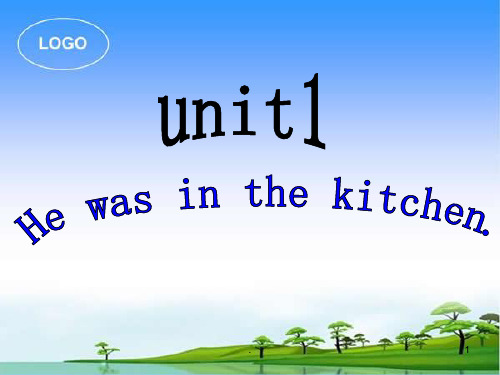
2.John is in the toilet. ( F ) 3.Amy found Lingling in
the toilet. 4.Tom is in the kitchen.
.
(T) ( F)
21
.
17
Tom
living room 客厅
.
18
He was in the living room.
.Leabharlann 19He is hiding behind the sofa.
hide
hiding 躲藏
.
20
根据课文内容,判断正误,对的 填“T“,错的填”F“。
1.Sam is the winner.
( F)
.
1
教学目标
1.在日常生活中使学生能用where did you find…/He was in the kitchen这类句型谈 论人或物品所处的位置。 2.通过使用简单英语做游戏,使学生体会到 英语学习的乐趣。
.
2
.
3
kitchen 厨房
.
4
bedroom 卧室
.
5
toilet 厕所,卫生间
.
10
.
11
.
12
.
13
I’m the winner.
You found me last.
find found 找到
.
14
.
15
Where did you find Lingling?
I found Lingling in the toilet.
.
16
Where is Tom?
bedroom
.
新外研(三起)小学英语六年级上册Module10 Unit1 课文及翻译
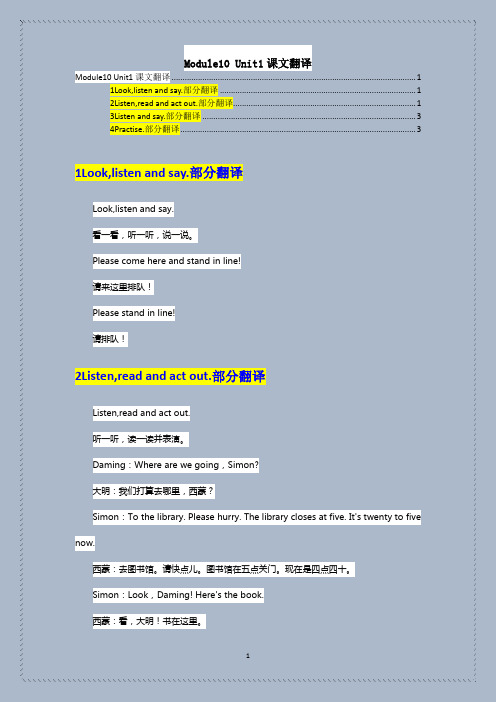
Module10 Unit1课文翻译Module10 Unit1课文翻译 (1)1Look,listen and say.部分翻译 (1)2Listen,read and act out.部分翻译 (1)3Listen and say.部分翻译 (3)4Practise.部分翻译 (3)1Look,listen and say.部分翻译Look,listen and say.看一看,听一听,说一说。
Please come here and stand in line!请来这里排队!Please stand in line!请排队!2Listen,read and act out.部分翻译Listen,read and act out.听一听,读一读并表演。
Daming:Where are we going,Simon?大明:我们打算去哪里,西蒙?Simon:To the library. Please hurry. The library closes at five. It's twenty to five now.西蒙:去图书馆。
请快点儿。
图书馆在五点关门。
现在是四点四十。
Simon:Look,Daming! Here's the book.西蒙:看,大明!书在这里。
Old Librarian:Look at the library rules. It says,“Don't talk in the library.”老图书信管理员:看图书馆规则。
上面写着:“不要在图书馆里讲话。
”Simon:Oh,sorry.西蒙:哦,对不起。
Old Librarian:Please be quiet.老图书馆管理员:请保持安静。
Simon:OK.西蒙:好的。
Simon:Here's my library card.西蒙:这是我的借书卡。
Young Librarian:Please stand in line!年轻的图书馆伊理员:请排队!Simon:Oh,sorry.西蒙:哦,对不起。
Module10,unit1

Module10,Unit1 Building the futurePage21 The severity of this catastrophe shocked Bob Geldof, an Irish musician who organized a charity concert called Live Aid to raise money for famine victims in Ethiopia.①(课后有注释翻译)②severe adj. severity n.2 Geldof intended the concert to raise money for and public awareness of the famine.①(课后有注释翻译)格尔多夫想通过音乐会为饥荒筹钱,并提高公众对饥荒的意识。
3 The concert also received so much attention around the world that it put great pressure on politicians and statesmen to do sth about the famine.①(课后有注释翻译)②put great pressure on 给某人施加压力4 On top of this, according to the United Nations, hunger and malnutrition claim ten million lives every year.①(课后有注释翻译)②on top of = besides, in addition to③claim: 夺去(生命)5 In trying to fight worldwide hunger, the United Nations set up the World Food Programme in 1963.①(课后有注释翻译)②set up 成立6 The Food-for-Growth programme, which targets people most at risk, such as babies, pregnant women and the elderly.①target②at risk7 It is without doubt an amazing achievement, but is it enough?①without doubt8 Today, some developing countries in Africa, Asia, and South America stand at a crossroads.①(课后有注释翻译)②at a crossroads “(人生或发展)处于关键时刻,在紧要关头”His life was at a crossroads when he quit his job.Page39 Developing countries can do this if they switch from importing food to producing it.switch10 Although this is a bit different from conventional business, the programme has a rapidly growing output and many people have been quite successful.11 There is a saying that goes …Give a man a fish, and you feed him for a day. Teach a man to fish, and you feed him for a lifetime.‟①(课后有注释翻译)②go 意思是“(谚语、消息等)说法是…”16 They are the result of teaching a man to fish so that he can fill his belly for a lifetime. fill one‟s belly “填饱肚子”Jack is not particular about what he eats. He is happy so long as it fills his belly.杰克对于吃不大讲究。
Module_10_Unit_1 haokejian
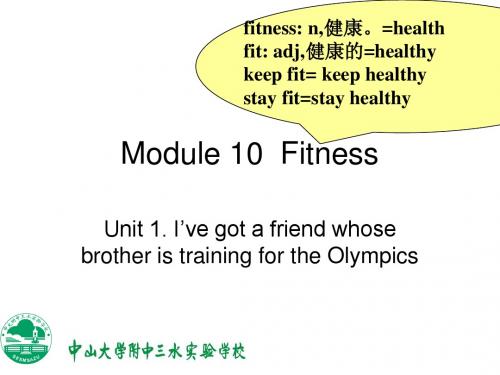
A little
Kind of 都可修饰形容词
• • • • • • • • • • • •
2. He gave up his hope. Can you give up smoking? Hanhan gave up writing last year. 知识归纳: 放弃/戒掉某物 give up sth. 后接名词或动词的ing形式 放弃做某事/戒掉 give up doing sth. 例题: 1) 最后他放弃了唱歌。 gave up singing At last, he _________________ at last. C 2) He never gave up ____ and he wrote a great book in 1978. • A. write B. to write C. writing
• • • • • • • •
• •
•
Task 2: listening part 3 1.How did Tony find the basketball training? Tony found it ________. tiring 2.Why does Lingling say Tony is lucky compared with her friend's brother? Because Tony is only trained for the school ________________ basketball team 3.What will the boy in Daming's team need to do? a lot of exercise He needs to do ____________. 4.Why isn't Tony allowed to use his father's camera any more? lost Because he almost _______ the camera last time. 5.Who has Betty just seen and what does he want to talk about? Betty has just seen the head teacher and he wants to talk about ________________ with Betty. the magazine
Module10 Unit1

课题:一年级起点第七册(NSE)Module 10Unit 1 I’ve got a stmach ache.【教材分析】语言功能:会询问和描述自己的病情。
语言结构:What’s the matter?I’ve got a stomach ache.教学目标:a.知识与技能:学习单词、短语:matter,medicine,toothache.b.过程与方法:能够听懂会说本单元句型,学会询问和描述自己的病情。
c.情感态度与价值观:明白要养成良好的饮食民间习惯,不要暴饮暴食。
教学重、难点:重点:能够听懂会说本单元句型。
难点: 学会询问和描述自己的病情。
[教学准备]卡片、录音机、幻灯片【教学过程】Module10 Unit1 I’ve got a stomach ache.大连市金州区红旗小学王晓璐一、Preparation.1.Greetings: Hello, everyone. How are you?2.Say a chant and do actions:I’ve got a dog.You’ve got a cat.He’s got a mouse.Look at that. I’ve got a rabbit.You’ve got a snake.She’s got a mouse,there in the lake.二、Presentation.1.Look at this magic box.There are many things in it .Do you want to get it? The first,I try.I’ve got a pencil. Who wants to try?Ss:I’ve got a chocolate biscuit.I’ve got a biscuit.I’ve got a sweet.I’ve got a bamburger.T: He’s got a hamburger.3.T:What have you got?S:I’ve got medicine.T:Do you like to take this medicine ?S: No, I don’t.T:I don’t like it ,too. But today, Sam must take it.Why? What’s the matter? What's the meaning ofmatter? Practise to read: matter三、Practice.1.Look at the screen. T:Where is he ?S:He’s at the doctor’s.at the doctor’s 在医生的办公室里在职业的后面加’s ,表示这个人工作的地方2.Now let’s go to the doctor’s to have a look.3.Now open your books,turn to page 38 and point,answer my questions, What's the matter with Sam? Find the sentence in the test.4.If you were Sam, What’s the matter?I’ve got a stomach ache.stomach+ache 器官+ache 表示器官有疼痛For example,toothache, headache, earache.Show cards and say quickly.5.Now you are the doctor,who can ask me ?What's the matter? I’ve got a ---.Practise in pairs.(do actions)6.Today, I know some children are at the doctor’s .What's the matter? Let’s have a look.What has he/she got ?Answer: He’s got a cold.She’s got a cough.She’s got a headache.He’s got a stomache ache.7.Let’s say a chant:What’s the matter? What’s the matter?I’ve got a stomach ache. I’ve got a stomach ache.What’s the matter? What’s the matter?I’ve got a headache. I’ve got a headache.What’s the matter? What’s the matter ?He’s got a cold. He’s got a cold.What’s the matter? What’s the matter?She’s got a cough. She’s got a cough.7.Listen again, then answer my questions:① What’s the matter ?② What did you eat yesterday?③ How many biscuits did you eat?8.Boys ask, girls answer ,then change.四、Production.1. Listen and repeat .2. Read the text by themselves.3. Act out the dialogue.4. Tick or cross:① Sam is at the doctor’s.② Daming has got a stomach ache.③ Sam has got a headache.④ Sam ate twenty biscuits.⑤ Sam ate too many chocolate biscuits.5.Fill in the blanks.① Sam is ___ the doctor’s.② Come ___ ,please.③ What’s the ___ ?④ What did you ___ yesterday?⑤ How many ___ did you eat?⑥ I ate thirty ___.⑦ That’s ___ many.⑧ Go home and ___ this medicine.五、Summary.1.Look at the blackboard,too many biscuits,sweets andhamburgers. If you eat them,what’s the matter?Choose one of them,practise to make a dialogue with your partner.e these words to make a dilaogue.板书设计Module10 Unit 1G1G2 G3 G4 What's the matter?I’ve got a stomach ache.What did you eat yesterday?I ate chocolate biscuits.【教学反思】本课我通过一个摸东西的游戏来激发学生学习的兴趣,同时也复习了以前学过的句型,I’ve got a ---,自然导入本课的生词,medicine.但是这个单词发音较难,一些学生发音有困难,对本课的练习产生了一些困难。
Module10 Unit1 核心词汇讲解

Unit1核心词汇讲解ntern/'læntən/n灯笼ThisisaChineselantern这是一个中国灯笼。
2.dance/dɑːns/n舞蹈;v跳舞Howwasyourdanceclass你的舞蹈课怎么样Loo!Thegirlisdancingunderthetree看!那个小女孩在树底下跳舞。
【拓展】派生词:dancer舞蹈家;dancingn舞蹈3.clean/liːn/v打扫Wedosomecleaningonceawee我们每周做一次大扫除。
【拓展】固定搭配:cleanout清除cleanu打扫房间dosomecleaning打扫卫生sweeothercoosdinnerforuseveryday我妈妈每天给我们做饭。
(1)coo作名词,意为“厨师”。
(2)cooing动名词,意为“烹饪”。
(3)cooer作名词,意为“炊具”。
4.meal/miːl/n一餐It’snotgoodforyoutomissmeals不吃饭对你身体不好。
meal泛指不具体的早、中、晚餐,是可数名词。
sfestival电影节10quite/waɪt/adv十分,相当Sheisquiteagoodgirl她是个相当好的女孩儿。
【拓展】“一个漂亮的女孩儿”可以用averyschooltoday 她今天不在学校。
11.hard/hɑːd/adv努力地;adj困难的Mymotheralwaysworshard我妈妈一直工作很努力。
Theworismuchtoohard这工作太难了。
12.join/dʒɒɪn/v参加Shewantstojointheclub她想参加那个俱乐部。
【拓展】join加入某个组织:jointhearmy参军joinin参加某个活动。
六年级上册英语教案-Module 10 Unit 1 Don't talk in the libra
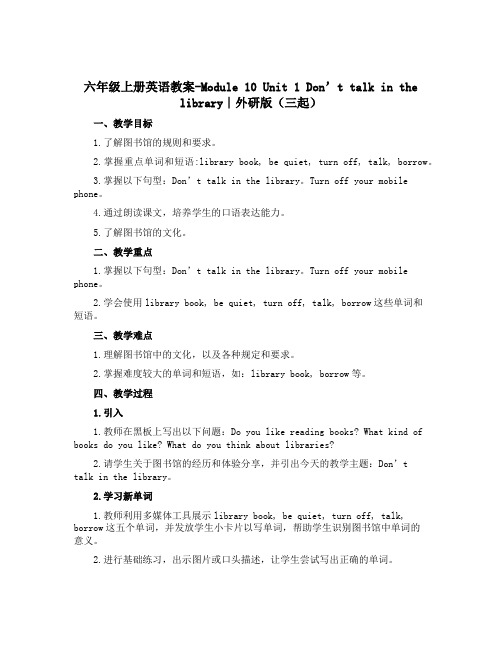
六年级上册英语教案-Module 10 Unit 1 Don’t talk in thelibrary∣外研版(三起)一、教学目标1.了解图书馆的规则和要求。
2.掌握重点单词和短语:library book, be quiet, turn off, talk, borrow。
3.掌握以下句型:Don’t talk in the library。
Turn off your mobile phone。
4.通过朗读课文,培养学生的口语表达能力。
5.了解图书馆的文化。
二、教学重点1.掌握以下句型:Don’t talk in the library。
Turn off your mobile phone。
2.学会使用library book, be quiet, turn off, talk, borrow这些单词和短语。
三、教学难点1.理解图书馆中的文化,以及各种规定和要求。
2.掌握难度较大的单词和短语,如:library book, borrow等。
四、教学过程1.引入1.教师在黑板上写出以下问题:Do you like reading books? What kind of books do you like? What do you think about libraries?2.请学生关于图书馆的经历和体验分享,并引出今天的教学主题:Don’ttalk in the library。
2.学习新单词1.教师利用多媒体工具展示library book, be quiet, turn off, talk, borrow这五个单词,并发放学生小卡片以写单词,帮助学生识别图书馆中单词的意义。
2.进行基础练习,出示图片或口头描述,让学生尝试写出正确的单词。
3.学习句型1.引入Don’t talk in the library和Turn off your mobile phone这两个句型。
2.辅以实物展示图片,让学生亲身感受使用这些句型的情境并进行口语练习。
Module 10 Unit 1 外研版英语九年级上册知识点详解
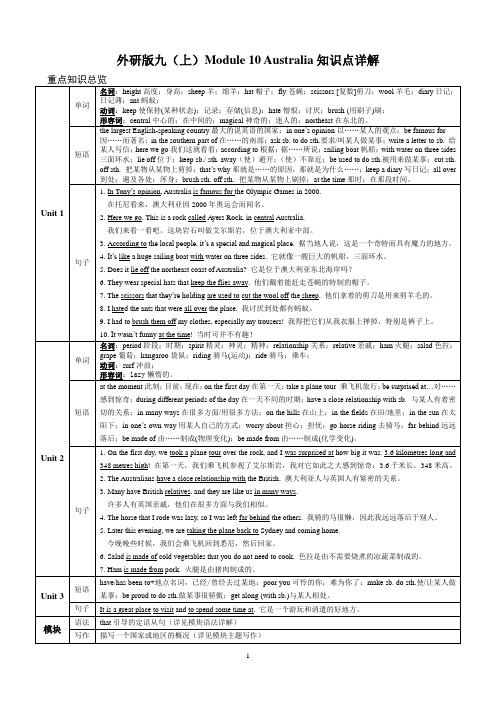
外研版九(上)Module 10 Australia知识点详解Unit 1 I have some photos that I took in Australia last year.★(A2).【知识点再现】In Tony’s opinion, Australia is famous for the Olympic Games in 2000. 在托尼看来,澳大利亚因2000年奥运会而闻名。
【知识点1】in one’s opinion意为“按某人的意见/观点;在/据某人看来”,其中one’s可用形容词性物主代词或名词所有格代替,常用来引出个人观点,相当于I think。
如:In Jim’s opinion, Mary is a lazy girl. 在吉姆看来,玛丽是一个懒惰的女孩。
In my opinion, cheating in exams does great harm to our study. 在我看来,考试作弊对学习非常有害。
【知识点2】【辨析】be famous for,be famous to与be famous as的用法辨析:①be famous for…=be known for…意为“因……而出名”,后接闻名/著名的原因。
如:Jin Yong is famous for his books. 金庸因他的书而著名。
China is famous for the Great Wall. 中国以长城而著名。
②be famous to…意为“为某人所熟知”,后接某人。
如:Jin Yong is famous to young people. 金庸在年轻人中很著名。
The singer is famous to lots of old people. 这个歌手为许多老人所熟知。
③be famous as…意为“作为……而出名”,后接表示身份、职位或称号等的名词。
如:Lu Xun is famous as a writer. 鲁迅作为一个作家而出名。
Module 10 Unit 1 We are going to different school(

Module 10 Unit 1 We are going to different school - 说课稿一、教材分析教材名称:外研版(三起)英语六年级下册教材单元:Module 10 Unit 1教材内容:We are going to different school本单元主要围绕孩子们即将离开小学,去到不同的初中学校这个话题展开,通过学习和掌握本单元的知识和技能,学生可以不仅了解自己即将面临的新生活,同时也可以提升英语学习能力,增强语言表达和交流的能力。
教材结构:1.词汇本单元的词汇主要涉及到与学校相关的话题,如:primary school, secondary school, classmate, uniform等。
2.语法本单元的语法主要涉及到“going to”表示将来的用法,如:I am going to a new school.3.阅读本单元的阅读主要讲述了小朋友们即将离开小学,去到不同的初中学校的故事,有助于学生了解即将面临的新环境。
4.听说本单元的听说主要是通过师生互动,帮助学生掌握本单元的语言知识和技能,提高学生英语口语表达能力。
二、教学目标1.学生能够熟练掌握本单元的词汇,如:primary school, secondary school, classmate, uniform等。
2.学生能够灵活运用“going to”表示将来的用法,如:I am going to a new school.3.学生能够理解阅读材料中的关键词汇和表达方式,了解小朋友们即将离开小学,去到不同的初中学校的故事。
4.学生能够通过师生互动,提高英语口语表达能力,增强语言表达和交流的能力。
三、教学重点和难点教学重点:本单元的词汇和语法。
教学难点:如何让学生更好地理解阅读材料中的关键词汇和表达方式。
四、教学方法本节课主要采用听说读写相结合的教学方法,通过师生互动和小组合作学习,促进学生积极参与,提高教学效果。
三年级上册英语教案-Module 10 Unit 1 Are you going to go to

三年级上册英语教案-Module 10 Unit 1 Are you going to goto Hong Kong 外研社(一起)课程概述本课程是三年级上册英语外研社教材的第10模块,第1单元。
本课程的主题是“计划未来的旅行”,学习目标是学习如何描述未来的旅行计划以及如何使用一般将来时态。
教学目标通过本单元的学习,学生将能够:1.了解如何使用一般将来时态描述未来计划;2.学习如何描述自己未来的旅行计划;3.学习如何使用询问他人未来旅行计划的句型;4.通过听力和口语训练,提高听力、口语技能,并能与他人交流未来的旅行计划。
教学重点•一般将来时态的用法•描述自己未来旅行计划的句型•询问他人未来旅行计划的句型教学难点•让学生熟练地使用一般将来时态•让学生能够自如地描述和询问他人关于未来旅行的计划教学准备•PPT和活动笔记•专业的音频设备和合适的音频,如听力材料和录音机•多媒体投影仪和课堂管理软件•学生练习本和笔教学步骤第一步:引入新单元1.老师向学生介绍新的单元并引入新话题-未来旅行计划。
2.老师让学生完成PPT上的预习任务。
3.老师用有趣的练习来激发学生的热情,并为学习创造良好的氛围。
第二步:学生活动1.学生阅读教材,学习并理解本单元的新单词和短语。
2.学生进行一项听力任务,将听到的英语话语与图片相匹配。
3.学生进行一项口语任务,互相询问并回答自己的未来旅行计划。
4.学生进行一项写作任务,写下自己的未来旅行计划,并介绍计划的内容。
第三步:复习和巩固1.老师通过回答更深入的问题、进行练习和活动的形式,巩固学生所学的知识和能力。
2.学生通过阅读、听力和口语任务巩固所学知识和能力。
3.学生将编写口语和写作本,以加深他们对所学的记忆。
教学总结本节课对学生的能力提出了很高的要求,他们需要学会如何使用一般将来时态来描述未来的旅行计划,以及如何使用询问他人未来旅行计划的句型。
通过语言训练,强化学生的听说读写能力,让他们更加自信和轻松地与他人交流未来的旅行计划。
- 1、下载文档前请自行甄别文档内容的完整性,平台不提供额外的编辑、内容补充、找答案等附加服务。
- 2、"仅部分预览"的文档,不可在线预览部分如存在完整性等问题,可反馈申请退款(可完整预览的文档不适用该条件!)。
- 3、如文档侵犯您的权益,请联系客服反馈,我们会尽快为您处理(人工客服工作时间:9:00-18:30)。
Listen and answer: What does Lingling want to do on the computer? She wants to write her homework. Who is good at using the computer? Daming.
Number the instructions in the correct order.
Listen and repeat /tF/
switch Read these words: teach, each, inch
Listen and repeat the questions.
How do I write my homework?
What’s the mouse? What do I do next? Where’s the printer?
save print
Answer the questions. 1. How do you open a document? You click “new document”. 2. Where do you write your homework? You write it in the new document. 3. How do you save the document? You read how to
write a composition on
your computer.
4. Where do you write its name? You write it in the box. 5. What do you do next? You click “save” again. 6. How do you print it? You click “print” and “OK”.
2 □ 4 □ 1 □ 3 □
Write your homework Print your document Open a new document
Save the document
Write the words they go with: click open use write new document a new document the mouse/the keyboard your homework/a name/the name/it the document it
Module 10
Unit 1 How do I write my homework on the computer
scanner monitor tower CPU
printer
keyboard
mouse
Complete these sentences with these words. connect switch on connect 1. First, _______ the monitor to the computer. switch on 2. Finally, _________ the computer.
